Where was the medinah market? Madinah market and regulation of commercial life.
Upon arriving in Medina, the Blessed Prophet -upon him blessings and peace- pointed to a different market place than that of the Jews, and insisted Muslims do their business there. It is a well known fact, after all, that separate market places are vital for acquiring commercial independence.
The Noble Messenger -upon him blessings and peace- took close interest in the market and commercial life of Medina, inspecting both the goods and merchants.
One day, he went next to a merchant by the market. Dipping his hands into the pile of wheat on the counter, he felt some moistness underneath, and inquired the reason.
“It was from the rain, Messenger of Allah”, explained the merchant.
“Could not have you put the moist part above where everybody could see?” counseled the Blessed Prophet -upon him blessings and peace-, adding “A cheater has nothing to do with me!”
Qays ibn Abi Garaza -Allah be well-pleased with him- tells:
“During the time of the Messenger of Allah -upon him blessings and peace-, we were still called ‘brokers’, up until the time he came next to us in the market and gave us the better name of ‘merchants’ and advised, ‘Merchants, know that lies and oaths smear their marks on trades, so mix some charity into it!’” (Ahmad, IV, 6; Abu Dawud, Buyu’, 1/3326)
Despite the enormity of care a person may take, forgetfulness and ignorance are bound to creep up in dealings and cause injustice. Thus, as a precaution, one ought to take measure by giving lots of charity from what is earned, the precise thing the Blessed Prophet -upon him blessings and peace- highlights in the above hadith.
Rifaa ibn Rafi -Allah be well-pleased with him- says:
“We were going to Musalla,[1] one day, with the Messenger of Allah -upon him blessings and peace- , who on the way happened to a see a group of people trading. ‘Merchants’, he called out, to which the group heeded by looking towards his way. ‘In the Hereafter traders (tajir) are most certainly resurrected as traitors (fajir)…Excepted are those who fear Allah, do what is good and give out charity.’” (Tirmidhi, Buyu, 4/1210)
Concerning the morals that ought to prevail in commerce, the Prophet of Grace -upon him blessings and peace- elaborates the below account which took place long ago between two virtuous men from the people of Israel:
“A man, before you, once bought a land from someone, and later found a pot of gold in the land. Carrying the pot in his hand, he returned to the man from who he had purchased the property and said:
‘Take your gold, for I only bought the land from you, not the gold inside!’
‘Never; for I sold you the land including all that was inside!’ replied he.
Unable to settle the dispute, they designated another man to arbitrate. After hearing them out, the arbitrator asked:
‘Have you any children?’ It turned out one of the men had a son, while the other a daughter.
‘Then wed them to each other’, the arbitrator suggested, ‘and spend the gold on them and give the rest out to charity.’” (Bukhari, Anbiya, 54; Muslim, Aqdiyya, 21; Ibn Maja, Luqata, 4)
An able merchant who had set out on long commercial journeys in his youth, the Blessed Prophet -upon him blessings and peace- proclaimed certain principles in the field upon his arrival at Medina. Some of his words on trade include:
“Nine tenths of income is in trade.” (Suyuti, I, 113)
“The most permissible and best of what a person eats is that which he has earned with his own hands.” (Ibn Maja, Ticarat, 1)
To be sure, in addition to its physical influence, food also exercises a spiritual influence. Each morsel consumed, whether it has come from a permissible, impermissible or even a doubtful avenue, seizes control of our spirits. The nature of what we eat affects our sensitivities. Alluding to the importance of permissibly acquired money in all deeds of worship, the hadith below, taking hajj or pilgrimage as a case in point, states:
“Whosoever visits the House with money acquired through impermissible (haram) means has departed from obeying Allah. Such a person, after enshrouding himself in the ihram places his foot on the stirrup of his camel and shouts ‘labbayk Allahumma labbayk’, only to receive a rejoinder from the Heavens, ‘no labbayk to you, nor a sadayk, for your earnings, your provisions, even your camel is illicit; so return as a sinner without earning any rewards, and grief over the calamities you shall face.’
But if a person sets on hajj with money earned permissibly and placing his foot on the stirrup of his camel exclaims ‘labbayk Allahumma labbayk’, he is met with a reply from the Heavens, ‘labbayk and sadayk…I respond to you, for your camel is licit (halal), as are your clothes and provision. So return with having earned loads of rewards, away from the smear of sin; and be joyful, for what is awaiting that will grant you happiness and bliss!’” (Haythami, III, 209-210)
Being an important and often violated matter, the door to the impermissible in earnings has been shut with the Divine proclamations specified in al-Baqara, immediately after shirk, that is ascribing partners to Allah, glory unto Him. Such that even al-Anam, al-Araf, Yunus and an-Nahl, suwar revealed in the Meccan period which therefore do not comprise a great deal of legal judgments, provide clarification regarding what is permissible and impermissible, immediately after ayat communicating the nature of a sound belief in the Almighty.[2]
Emphasizing the need of courage and honesty in trade, the Blessed Prophet -upon him blessings and peace- says:
“A brave merchant who puts his goods up for sale is provided for, while a black-marketer is cursed.” (Ibn Majah, Ticarat, 6)
“A coward merchant is deprived, while a brave merchant is provided for.” (Daylami, II, 79)
Some further commercial principles instated by the Messenger of Allah -upon him blessings and peace-, are explained in the below two ahadith:
“A buyer and a seller are free to change their minds, so long as they do not leave each other’s presence. If they contract an honest deal, where they make known everything as it is, their trade is made prosperous. But given they hide some things and lie, prosperity flees their trade.” (Bukhari, Buyu, 19; Muslim, Buyu)
“Oaths attract attention to goods, though they divest it of prosperity.” (Bukhari, Buyu, 26; Muslim, Musaqat, 13)
The Noble Prophet -upon him blessings and peace- banned such practices as intercepting the goods before they arrived at the market place, completely concluding the deal before the goods reached their owner, selling goods prior to having possession of them, bidding for goods despite an already concluded deal and inciting opposition between customers.[3]
The Prophet of Mercy -upon him blessings and peace-, stressing the need of adopting an easygoing attitude in trade, states:
“May Allah abundantly grant His Mercy to a person generous and lenient in buying, selling and in accepting an outstanding debt.” (Bukhari, Buyu, 16)
“Allah dealt with a person, who lived before you, with mercy, for no other reason than that the person would show leniency in buying, selling and when soliciting the money owed to him.” (Tirmidhi, Buyu’, 75/1320)
Being lured by greed and the dazzle of the world and supposing there is more to be earned by disobeying the guidelines set by the Blessed Prophet -upon him blessings and peace- only incurs the danger of poverty in the Afterlife. Honest merchants striving to gain the pleasure of the Almighty and provisions for the Hereafter, on the other hand, are subject to the wonderful news of the Prophet -upon him blessings and peace-:
“A Muslim merchant, honest and trustworthy, will be among the martyrs in the Hereafter.” (Ibn Maja, Ticarat, 1)
[1] Musalla is a name given to a large area reserved for the purpose of accommodating Friday, eid or funeral salats, in congregation, in a given community. Musallas were originally set up in the outskirts of towns to host major communal salats, such as that of Friday or eid, in place of other mosques. It would thereby enable at least a weekly gathering of the entire residents of a town.[2] al-Anâm, 136-152; al-Arâf, 32-33, 169; Yûnus, 59-60; an-Nahl, 95, 115-116. See, Draz, an-Nabau’l-Azîm, p. 193.[3] See, Bukhari, Buyû, 70-72; Muslim, Buyû, 29.





